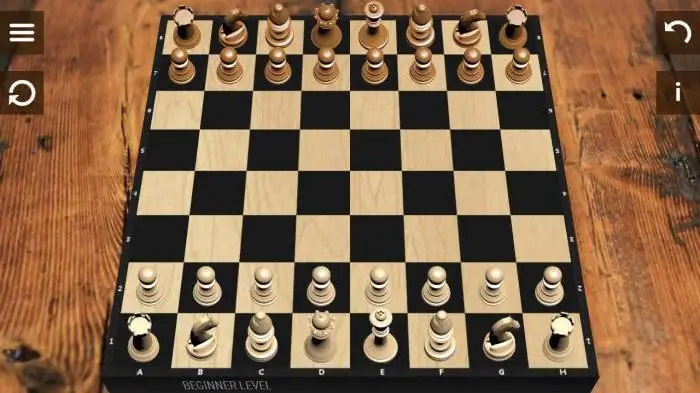
Table of contents:
- Author Sierra Becker becker@designhomebox.com.
- Public 2024-02-26 03:46.
- Last modified 2025-01-22 22:09.
Chess fans are well aware that the result of the rivalry can be not only the well-known "checkmate", but also another, much more ambiguous result, which is called "stalemate". This is such a position in a chess game when the king is not in check, but at the same time there is no possibility of steps for the pieces. The situation is hopeless and for some time means a draw in the classical chess game.

Why are there no winners and losers?
How does stalemate occur in chess? As a result of previous moves (in particular, the move made by the opposite player), the player who has the right to move cannot use this opportunity, since there are no options for moving pieces that do not violate the rules of the game. At the same time, the king is not in check, which means that no one wins. As a result, there is a hopelessposition, no losers and winners, but no moves either.
This situation was resolved and designated in the 19th century as a draw, which is quite fair. It is this interpretation of the stalemate that is enshrined in the World Code of Chess Rules (FIDE). However, earlier in different countries of the world, other options for interpreting the deadlock that had arisen were proposed. Let's take a look at some of them.

When did a stalemate not equal a draw?
So, for example, in the Middle Ages in many European countries, as well as in the Middle East, the winner was the one who made the last move in a chess game. In Spain in the 15th-18th centuries, this situation also brought victory to the last player who looked like it, but its price was lower than the classic win. As a result, the winner received not all, but only half of the legal prize.
There were, however, other interpretations of this outcome of the game. The player who put up a stalemate (that is, created a stalemate) was considered a loser. These rules were in effect in the 9th century in India, in the 17th century in Russia, and in England were applied until the 18th century.
A draw in a chess game was declared in Italy and France, and since the 19th century has become a generally accepted rule around the world.
"Our whole life is a game", or About stalemate situations outside the playing field
However, not only in chess the term "stalemate" is used. This is a fairly common expression today, applicable to various life situations. It can be used in various areas of life,from love/family relationships to politics and economics.
Let's give a few typical examples when a stalemate occurs in life.

Pat in private life
What does the stalemate in the family mean? Often there are cases when, in the course of living together, relationships come to a standstill. However, to come to some kind of solution, to find a way out of it does not work. For example, a classic story: a housewife takes care of the house and raises children, the husband drinks, but brings money to the family. Their relationship has long been based only on children, but they cannot part, because children need both a father and a mother, and the woman herself cannot provide for the family. On the other hand, the offspring grows up and observes a constantly drinking father and an unhappy mother. Is it worse to divorce or continue to "artificially support family life"? Often in such cases, women feel the hopelessness of their situation, but they cannot solve anything. On the face of a stalemate, but with a strong desire, it can be resolved.
There are less tragic examples of such situations. The simplest - two young men are looking after the girl. One is promising, promising and stable. She is in love with another, but she is not sure of his constancy, and even the possibilities to achieve success. What to choose - confidence and comfort or love with obstacles? Here is a stalemate for you. It is the inability to make a choice (move).

Stalemate in the economy
Another example from the field of economics. Disproportionin the Russian venture capital market by sector and by the ratio of free money and real investments. Most of the investors' funds are invested in fast-payback Internet projects (up to 70%), which do not have much potential in the long run. At the same time, biotechnology/pharmaceuticals, the most attractive in terms of importance and growth rates, receive only 15% of the available investments in the market, while other segments account for even less available money. At the same time, there is a shortage of worthwhile projects and companies in which funds could be effectively invested. The result is a stalemate - an overabundance of free cash along with a lack of projects to invest.
Stalemate in the political arena
Often this term is used in relation to various political events. So, for example, it was with the rally on Bolotnaya Square and the situation that arose in Ukraine. Particularly noteworthy was the situation on the Maidan. The protest actions, which began with support for European integration, grew into a mass movement as a result of beating protesters by the police. The movement began to gain ever greater proportions due to the growth of the discontented (which is not surprising). But it was no longer possible to turn back and leave, otherwise it would have been a defeat and in the future one would have to "hide from the police in any peaceful situation" (according to sociologist Andrei Bychenko). However, the authorities could not just take and send Zakharchenko to resign, and start criminal cases against the Berkut fighters (who beat the students). And so it went ona confrontation that led to numerous deaths and gave rise to what we have at the moment. The situation is a stalemate, but it was possible to get out of it with less losses with competent and deliberate behavior on the part of the authorities.

Conclusion: don't create stalemate
There are many examples when a dead end occurs in a game or in life. And if in chess this is just a draw, then a stalemate in life can turn into a much sadder, and sometimes even dangerous outcome. In personal life, a sense of hopelessness can gradually develop into a protracted depression; in the economy, it can lead to loss of financial resources and imbalances in a particular market; once happened not only in Ukraine, but also in many other countries).
That is why it is so important to always have a choice and not allow a stalemate to arise, when there is no way out, and it is impossible to continue the "game".
Recommended:
Sweater with lowered shoulder spokes. What does a beginner need to know?

The stores offer just a huge range of goods, but even this does not allow many buyers to purchase the treasured thing. And then especially creative ones decide to implement the idea on their own. This article has been written especially for them. It details how to knit a jacket with a lowered shoulder using the selected threads and knitting needles
What properties does camel hair have?

Since ancient times, camel hair has been used by man to make blankets, stoles and clothes. In this article, we will tell you about the properties of this material and pricing
What is a butterfly collector called? What does it take to create a beautiful collection?

Butterfly collecting is one very old, common and fascinating hobby. The opportunity to preserve the short-lived beauty of nature in your home for decades attracts millions of enthusiastic people around the world
Why does the sewing machine break the thread: the main causes and how to fix them

Why does the sewing machine break the thread? Main reasons: defective needle, incorrect thread tension, incorrectly inserted tension regulator spring, notches on machine parts, incorrectly selected material
How does an elephant walk? Chess - how the pieces move

Chess is the oldest entertainment known to us. No matter how much you play them, they cannot get bored, because each game is completely different from the previous one
